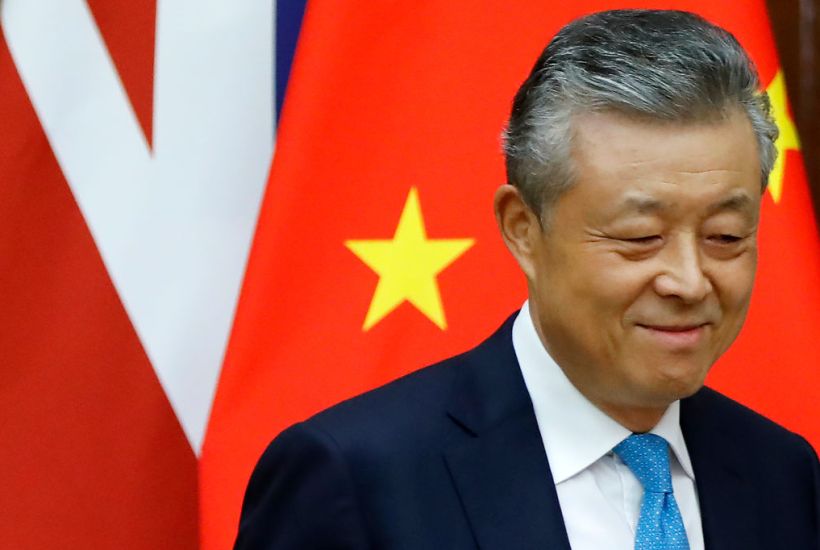How the west responds to China is now the defining foreign policy issue of our time. The communist party’s suppression of information about the coronavirus, the global lockdown and thousands of deaths have forced the world to confront the potential consequences of the regime governing China. Even Tory MPs – many of whom were previously relaxed about Chinese investment – are arguing for a reset. But if the UK, which currently lacks a coherent strategy for Sino-British relations wants to avoid kowtowing to Beijing, an important question needs answering: what does China actually want from us?
This question baffles many. Yet the Chinese communist party, the all-powerful entity whose politburo sits at the apex of a single-party system, has two clear aims. Number one is to stay in power; understanding how the CCP perceives international issues are received at home is key to determining Chinese foreign policy.
The second is to fulfil its historic mission of restoring China’s ‘rightful’ pre-eminence; what the present leadership calls ‘the Chinese dream of national rejuvenation’. Under Xi Jinping the previous mindset that China should bide its time while building its strength is now history. Xi believes China’s time has come.
So what does this mean for the UK? Obviously, there’s the things common to autocratic regimes. Strenuous efforts have been made to construct a ‘great fire-wall’ around China, blockading foreign internet providers promoting dangerous democratic ideas. But this only goes so far. Given the vast numbers of Chinese visiting the UK and the immense difficulty of truly excluding all foreign internet content, serious attempts are made to keep critical voices quiet.
Likewise, the CCP wants to be viewed positively by those who matter in Britain. This isn’t part of a strategy to export its political ideology like the Soviet Union. Chinese leaders since Mao have been clear their project is specific to China, as evident from the conceptualisation of the guiding party doctrine as socialism, but with unique ‘Chinese characteristics’.
But as China’s international presence expands so do those interests that depend on national-level cooperation. The UK, with its soft power, seat at the UN security council and well-respected military capabilities can still bring substantial influence. Any such foreign policy successes secured with accompanying British respect for a newly assertive Chinese government are shouted about domestically to reinforce claims to be delivering national rejuvenation. Equally, a friendly UK is less likely to press China’s tender areas such as Xinjiang or Tibet, both of which contain separatist movements, or challenge the CCPs obsession with Taiwan’s independence. British connections with Hong Kong, another trouble spot, ensure strong lobbying to stay quiet.
Recruiting the British to the Chinese position is also part of the wider ‘United Front’ strategy, coordinated by a United Front department reporting directly to the CCP’s central committee. Simply put, United Front tactics involve identifying a principal enemy, its supporters and the intermediate zone full of ‘wavering elements’, whom the party must win over or neutralise to isolate and thus weaken the principal enemy. No marks for guessing the principal enemy is the United States. Here, Huawei’s involvement in the UK’s 5G network with its likely damage to Anglo-American and Five Eyes intelligence collaboration would be a major victory for United Front diplomacy.
The CCP must also continue delivering huge economic growth. Stuffing the people’s mouths with gold is a major reason its rule is seen as legitimate. This direct interest in maintaining a stable trading environment is why Chinese operations in the UK are less destructive than similarly active countries like Russia, despite shared antagonism to western political systems.
Given ‘Made in China’ has been stamped on most manufactured goods bought by the rest of the world for decades the Chinese have accumulated enormous foreign exchange reserves (the European Commission estimate 31.9 per cent of global total). With diminishing returns in the slowing domestic economy, China’s leaders have made substantial capital available to businesses to chase higher returns abroad that also pay a political dividend. The UK as the world’s sixth largest economy represents a significant market for what’s still a highly export-oriented Chinese economy and one remarkably open to non-British majority corporate ownership relative to others like the US (where Chinese enterprises, if allowed, must register under the foreign agents registration act).
Britain also has intellectual property assets China needs to rectify the innovation gap it suffers with competitors that constrains its economy. The Chinese ambition is to move away from being the world’s factory manufacturing cheap goods poorly remunerating its workers, towards higher value products and services. In 2016, the People’s Republic operated a $17bn (£13bn) intellectual property royalties’ deficit with foreign countries. The UK ran a surplus. Right now, China addresses the shortfall by stealing western technology, but this approach means China will always be one step behind.
Where does this leave the UK? The truth is in the aftermath of the coronavirus pandemic western nations in recession are likely to be uncomfortably dependent on a recovery in the Chinese economy, the keys to which reside in CCP headquarters, to power our own. This gives Beijing a strong hand. We have limited cards to play. To maximise any aces in the pack, a coordinated response with our allies for our collective financial and political security will be crucial.
Got something to add? Join the discussion and comment below.
Get 10 issues for just $10
Subscribe to The Spectator Australia today for the next 10 magazine issues, plus full online access, for just $10.
Dr James Woolas is a former postgraduate student of Chinese politics at King's College London




















Comments
Don't miss out
Join the conversation with other Spectator Australia readers. Subscribe to leave a comment.
SUBSCRIBEAlready a subscriber? Log in